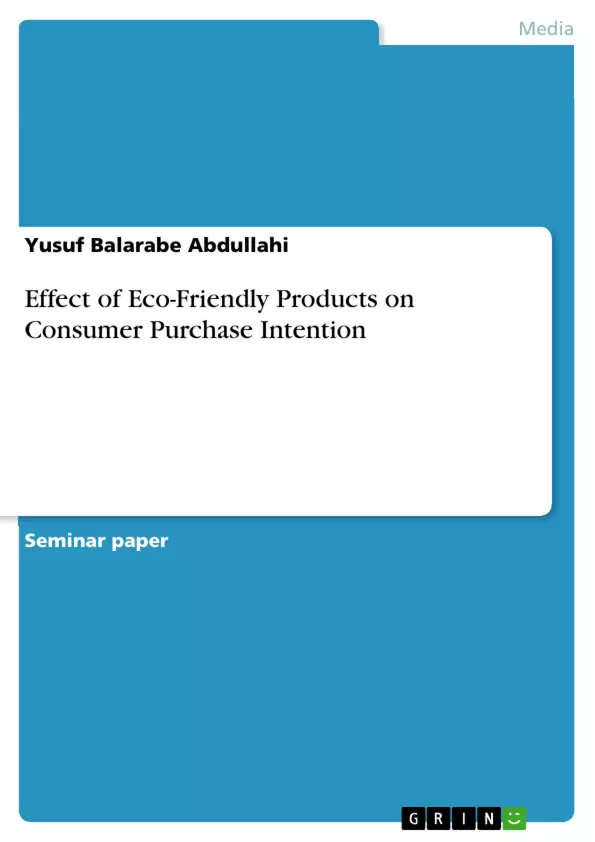This study investigates the customers' intention to pay the premium for green product, rather than their purchase intention crosswise over various product classes. It attempts to predict the factors that drive green purchase decisions and purchase intention. Organized surveys are utilized for data accumulation and ordinary least square regression, analysis of variance have been utilized for analysis of information. Results recommend the strength of customers' discernment about the functional parts of green products on their purchase intention.
Extraordinary economic development activated by innovation revolution; globalization has prompted market driven development in consumption pattern in the rising economies. Change in consumption pattern has prompted overconsumption or unsustainable consumption and over abuse of assets. In the present period the worry over environmental downturn, decrease of environmental effect and practical development has turned into the topic of interest among the researchers, academicians, specialists and even industries. Consumer research perceives that their observations for a product, approach, understanding about the product and its producer and different contextual factors assume a prevailing part in their decision-making process.
Purchase intention, which signifies the most extreme value that a consumer will pay for a specific or a heap of products, play a conclusive influence on their decision behaviour. Accordingly, in the crossroads of environmental decay, implementation of friendly environmental practices inclusive of green product consumption relies upon their tendency to pay the green value premium.
The present study endeavours to dissect the factors predicting consumers' intention to pay the green value premium for products with green certification. The environmentally feasible or environmental good or green products involves a rundown of potential advantages to the environment as they are made of environmental-accommodating assets, have asset preservation potential, can be reused and have the least environmental effect at all phases of its lifecycle.
In section two a concise depiction of the constructs has been given, trailed by research methodology in the third segment. The analysis of information with the findings of the study and conclusion are exhibited in the fourth and fifth section. The last segment gives the managerial ramifications of the study.
Inhaltsverzeichnis (Table of Contents)
- Introduction
- Contextual Factor (Cf)
- Corporate Environmental Performance (Cep)
- Purchase Intention For Different Brands (Pi)
- Selected Categories Of Green Products
- Literature Review
- Perceptual Factor (Pf)
- Research Methodology
- Data Collection
- Measurement Development
- Analysis And Results
- Factor Analysis, Construct Validity & Reliability
- Multiple Regression Analysis With Pi As The Dependent
- Results Of Analysis Of Variance
- Discussion And Conclusion
- Recommendations
Zielsetzung und Themenschwerpunkte (Objectives and Key Themes)
This study aims to investigate the factors that drive green purchase decisions and purchase intention in developing economies. It explores the relationship between consumers' perception of green products, contextual factors, and corporate environmental performance on their willingness to pay a premium for environmentally sustainable products.
- Consumer Perception of Green Products
- Contextual Factors Influencing Green Purchase Decisions
- Corporate Environmental Performance and Consumer Attitudes
- Purchase Intention for Different Green Product Categories
- Green Value Premium and Sustainability
Zusammenfassung der Kapitel (Chapter Summaries)
- Introduction: The study introduces the concept of green products and the importance of understanding consumer purchase intention in developing economies. It outlines the key constructs of perceptual factors, contextual factors, corporate environmental performance, and purchase intention. It also presents the specific categories of green products examined in the study, namely vegan foods, ventilation systems, and electron fluorescent lamps.
- Literature Review: This chapter provides a comprehensive overview of existing research on consumer perception of green products, contextual factors influencing green purchase decisions, and the role of corporate environmental performance. It explores the theoretical frameworks and empirical findings that underpin the study's hypotheses.
- Research Methodology: The research methodology section details the data collection methods, including the design of the survey instrument and the target population. It also describes the measurement development process, which involves defining and operationalizing the key constructs.
- Analysis and Results: This chapter presents the findings of the study, using statistical techniques such as factor analysis and regression analysis. It examines the relationships between the key variables and discusses the significance of the results.
Schlüsselwörter (Keywords)
The study focuses on the following key themes and concepts: Perceptual Factor, Contextual Factor, Corporate Environmental Performance, Purchase Intention, Sustainable Products, Green Value Premium, Developing Economies, Consumer Behavior, and Environmental Sustainability.
Frequently Asked Questions
What factors influence the "green value premium"?
The willingness to pay more for eco-friendly products is influenced by consumer perceptions of functional benefits, corporate environmental performance, and various contextual factors like availability and social norms.
How does Corporate Environmental Performance (CEP) affect purchase intention?
Consumers are more likely to purchase green products if they perceive the producing company as genuinely committed to environmental sustainability, rather than just using it as a marketing tactic.
Which green product categories were analyzed in this study?
The study focused on vegan foods, eco-friendly ventilation systems, and electron fluorescent lamps to understand intentions across different product classes.
What is the main challenge for green products in developing economies?
The main challenges include unsustainable consumption patterns driven by rapid development and the need to convince consumers that the long-term environmental benefits justify the higher initial price.
What are "Contextual Factors" in green consumer research?
These are external factors such as price, ease of purchase, and the social environment that can either support or hinder the translation of green intentions into actual purchases.
- Arbeit zitieren
- Yusuf Balarabe Abdullahi (Autor:in), 2021, Effect of Eco-Friendly Products on Consumer Purchase Intention, München, GRIN Verlag, https://www.grin.com/document/1157671



